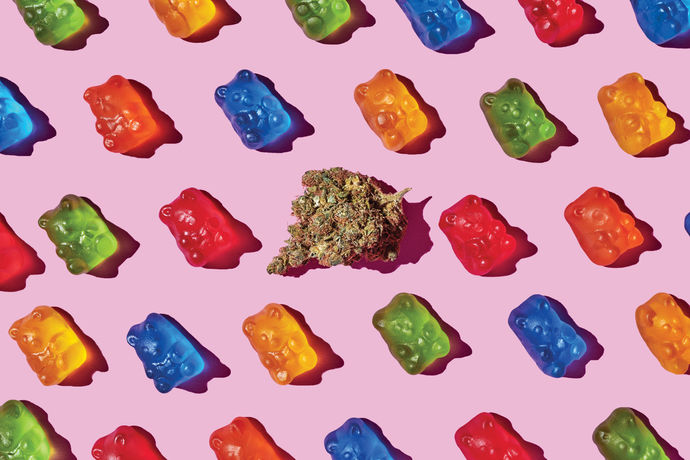The pathway to cannabinoid legalization weaves through a thick jungle of red tape.
Advocates hack their way through the tangles using scientific rigor and popular support, but with every swing of the machete, more vines cascade from the stifling canopy of bureaucracy.
The legal cannabinoid industry took a huge leap forward with the 2018 Farm Bill, which legalized the sale of hemp-derived cannabinoid products as long as they were manufactured from plant material that contained less than 0.3% delta-9 THC by dry weight.
As the summer of 2020 came to a close, the DEA released an Interim Final Rule (IFR) regarding cannabinoids that have people questioning whether the drug enforcement arm of the government is opening a backdoor that will allow for the prosecution of the CBD and nascent delta-8 THC industries.
Mitigating THC or mitigating risk
When it comes to legal products, the Farm Bill clearly outlined what constitutes federally legal plant material. According to the text, hemp flower with less than 0.3% delta-9 THC is considered legal.
The problem with the bill, and the DEA’s new IFR, is that it muddies the water regarding extraction. Just ask Ted Bernhard, Managing Director of the Oregon office of Cultiva Law, which operates Cannabis industry-specific law practices in Washington, Oregon and California.

“During extraction and processing, they may end up over the 0.3%, even if their end product is compliant and less than the 0.3%,” Bernhard said during a phone call in September.
“During extraction and processing, they may end up over the 0.3%, even if their end product is compliant and less than the 0.3%,” Bernhard said during a phone call in September.
Think about that for a moment. The way the IFR and Farm Bill are written – even if the flower and the end product are both compliant – during the extraction process, the material could enter the realm of noncompliance. That’s because the extraction process concentrates the compounds, which then undergo dilution later in the manufacturing process.
“They technically would be in possession of illegal marijuana at that point,” Bernhard said, referring to the extraction stage.
As an exercise, consider if it were alcohol. Many states have rules regarding alcohol content for end consumers. During distillation, alcohol content can reach concentrations of 90% before being diluted down. In its 90% stage, it would be illegal to sell in many states – hence the dilution. Imagine a governmental enforcement agency putting rules in place that would allow them to bust down the doors in the middle of the distillation process, before the alcohol is diluted into vodka.
According to Bernhard and many others familiar with the situation, the DEA’s proposed rule has the same effect for the hemp industry. The IFR effectively makes it possible for the DEA to bust into an extraction facility during this midpoint, and charge operators with possession of marijuana under the Controlled Substances Act.
Though the IFR isn’t entirely off-brand for the DEA, lawyers, policy geeks and industry business owners are gobsmacked by the vagueness and potential for harm it introduces to the hemp industry.
“What actual harm is it if during the processing process, it rises above that percentage? It’s not an environmental hazard,” Bernhard said. As long as the end product is compliant, he argues, it should not matter.
Delta force
In its current state, the IFR could cause damage to the huge CBD industry, as well as the emerging delta-8 tetrahydrocannabinol (delta-8 THC) market – which in the years since the Farm Bill – has been gaining popularity with entrepreneurs and patients in the therapeutics community.
According to the National Institute of Health’s National Library of Medicine, delta-8 tetrahydrocannabinol (THC) is an analogue of THC with “antiemetic, anxiolytic, appetite-stimulating, analgesic, and neuroprotective properties,” and offers those potential benefits with a significantly lower psychotropic potency than delta-9 THC, which is the compound responsible for the classic high most people associate with traditional Cannabis consumption.
Studies have shown a significantly positive impact on the side effects of chemotherapy when delta-8 THC is administered, with the potential beneficial uses of the cannabinoid generating a significant and growing demand in the market.
The Farm Bill and the IFR create two problems for the delta-8 industry. First, as currently written, the rules prohibit the manufacture and sale of “synthetically derived” THC. Bernhard says the definition of “synthetically derived” is too vague, leaving it open to interpretation, and thus exposing manufacturers to risk of prosecution.
Since DEA rules prohibit the creation and distribution of synthetic cannabinoids, as well as the extraction of cannabinoids from any plants with more than .3% delta-9 THC by dry weight, the only avenue for those who wish to produce and market delta-8 is from hemp. But then manufacturers run the risk of temporarily being in the possession of material with greater than 0.3% delta-9 THC during the extraction process, running into the aforementioned issues.
Unless the language is clarified in order to allow for the extraction process, involvement in both the CBD and the delta-8 markets will be rife with risk.
“It could cause people not to stay in the business, or decrease the supply,” Bernhard said. “I’m not seeing anyone who’s getting out of the business because of this, but I think the hope is to get some greater clarification.”
Make a change
“If they go ahead with this, we’ll be back to the, ‘It’s technically illegal, but we just hope you won’t enforce it,’” he said. “That’s not good for raising capital, that’s not good for planning.”
The way Bernhard sees it, unless the rules are changed, the entire hemp and Cannabis industries will take a huge step backward.
“If they go ahead with this, we’ll be back to the, ‘It’s technically illegal, but we just hope you won’t enforce it,’” he said. “That’s not good for raising capital, that’s not good for planning.”
For those who want to help influence the future, it’s not too late. The DEA is currently accepting public comments on the IFR until October 20 at this link.
For the time being, Bernhard remains optimistic for the industry and hasn’t seen much panic at this point.
“As of now, people are staying level-headed,” he said. “Pushing for change and submitting their comments.”










